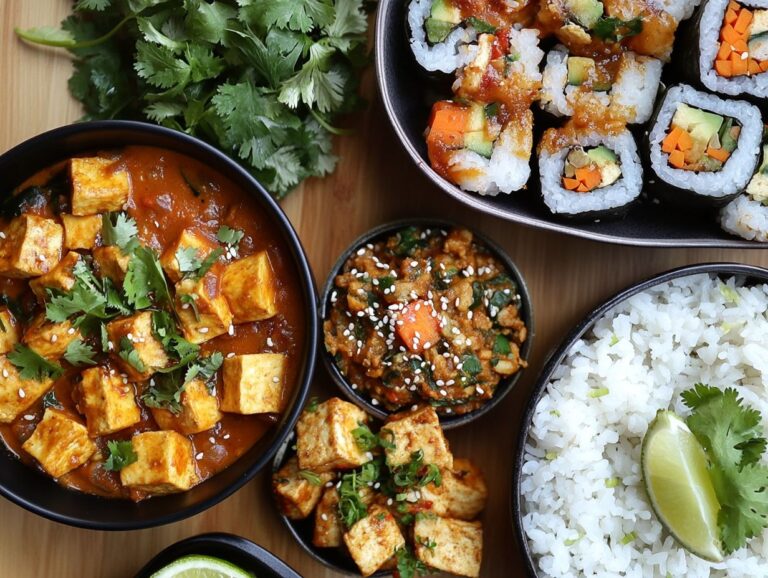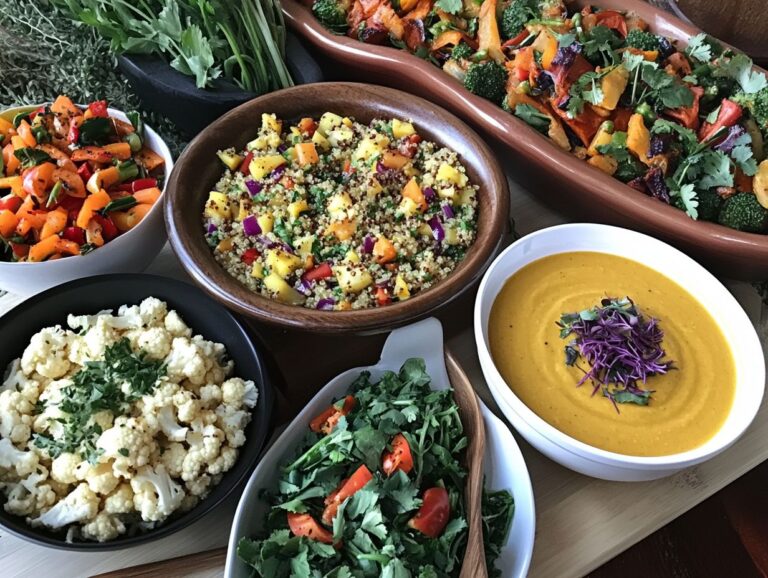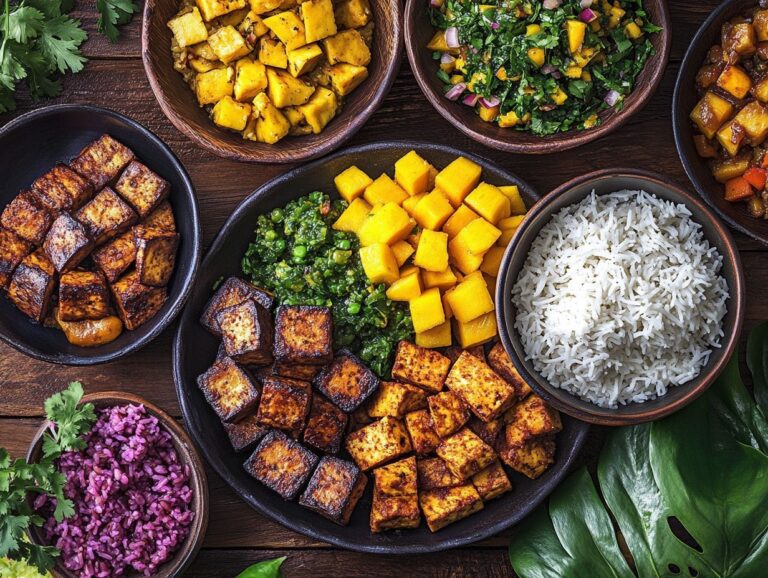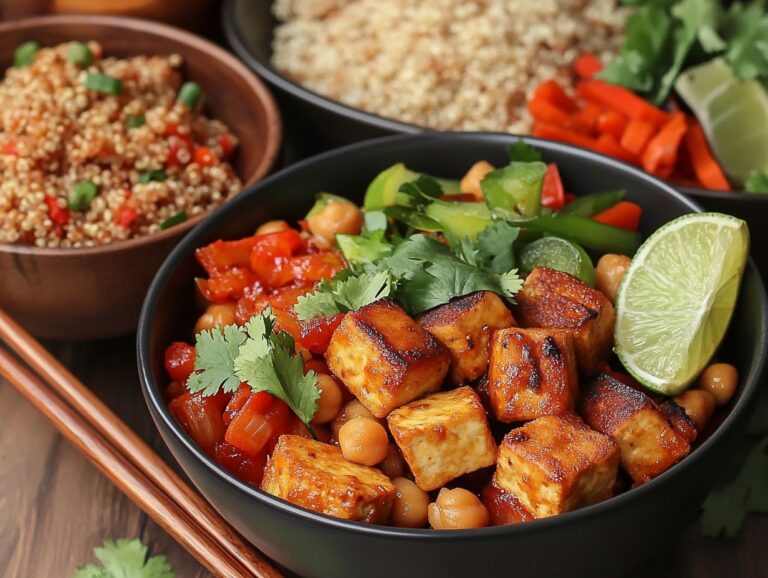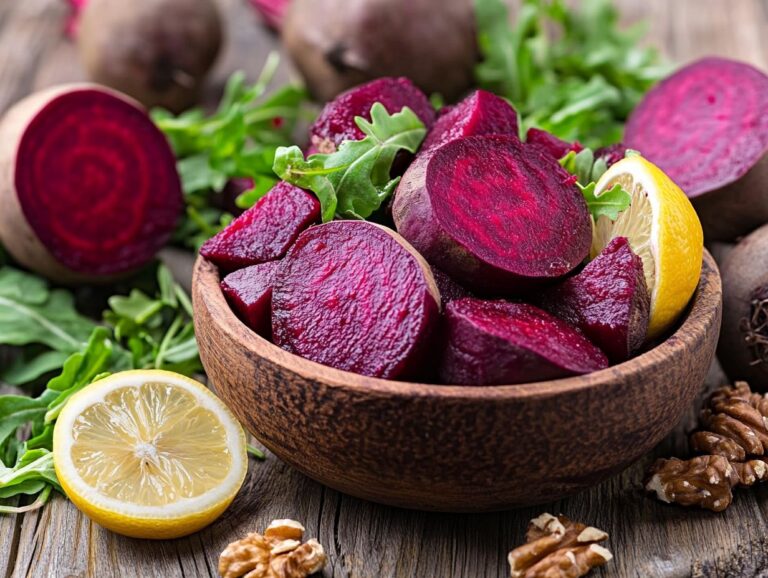This article explores the relationship between bodybuilding and veganism, focusing on how to achieve optimal muscle growth and recovery without using animal products. It examines the intersection of plant-based diets and bodybuilding, highlights essential nutrients and vegan protein sources, and offers guidance on meal planning. Additionally, the article includes delicious recipes, discusses supplements, and provides tips on staying motivated.
Why Choose Veganism for Bodybuilding?
Veganism offers several benefits for bodybuilding, including improved muscle growth, faster recovery times, and enhanced performance nutrition. A vegan diet emphasizes whole foods and provides a diverse range of plant-based proteins, such as legumes, quinoa, and tofu.
These plant-based protein sources are essential for bodybuilders aiming to reach their maximum strength training potential. High-protein vegan recipes help maintain muscle mass and are often part of eco-friendly diets that promote sustainability.
Effective vegan food preparation strategies enable enjoyable meal planning that supports long-term fitness goals. This plant-based approach supplies important amino acids that aid in muscle gain and recovery, all while being lower in saturated fat and supporting strength development.
Incorporating protein shakes made from hemp or pea protein can effectively supplement protein intake, as these readily available powders enhance dietary protein content and help meet requirements during intense bodybuilding phases.
Additionally, the higher dietary fiber content in vegan diets supports digestion and promotes satiety, which is beneficial for all athletes seeking to maintain a healthy weight. Including a variety of colorful fruits and vegetables ensures that bodybuilders receive the necessary vitamins and minerals to properly fuel their training and workouts.
Nutritional Requirements for Bodybuilding
Nutrition plays a crucial role in bodybuilding by helping individuals meet their nutritional requirements for achieving fitness goals.
A well-structured bodybuilding meal plan should include all macronutrients—healthy fats, carbohydrates, and high-protein foods—to ensure that the body receives the essential vitamins and minerals necessary for strength training and muscle recovery.
Foods rich in dietary fiber, such as spinach and lentils, along with various vegan protein sources like tofu and tempeh, can significantly enhance workout nutrition and overall health, promoting food sustainability and nutrient density.
Additionally, proper meal timing and strategies for maintaining a calorie surplus are important for optimizing performance nutrition.
Key Nutrients for Muscle Growth and Recovery
Key nutrients essential for muscle growth and recovery include plant-based proteins, amino acids, and dietary elements that support strength training. Bodybuilders should focus on a well-rounded diet that incorporates iron-rich foods, vegan sources of calcium, and high-energy meals, all of which are crucial for maintaining muscle mass and overall health, as well as enhancing performance nutrition.
Examples of protein-rich foods, such as nutritional yeast, quinoa, and chickpeas, not only aid in muscle recovery but also provide a wealth of antioxidants, vitamins, and minerals as part of a balanced diet. The right combination of nutrients can significantly enhance athletic performance and speed up workout recovery, contributing to overall physical fitness.
Additionally, adequate protein intake is vital for those who aim to build muscle effectively. Plant-based snacks like edamame and hemp seeds are excellent sources of essential amino acids, contributing to improved protein quality and muscle synthesis.
The importance of a balanced diet cannot be overstated, as achieving nutritional balance requires a variety of vitamins and minerals, including magnesium and vitamin D, which are essential for muscle function and recovery. Regular consumption of these multivitamins has been shown to enhance endurance and reduce fatigue, leading to better performance in strength training activities.
Vegan Protein Sources for Bodybuilding
Bodybuilders who choose to maintain a vegan diet have access to a wide variety of high-protein foods.
Lentils, chickpeas, tofu, and tempeh provide adequate protein and essential amino acids, which are crucial for muscle growth and recovery.
Additionally, vegan protein powders can enhance protein intake, especially when incorporated into vegan smoothies or snacks that also include healthy fats and carbohydrates, such as post-workout meals. These nutrition options help with nutrient timing and workout nutrition.
Utilizing diverse plant-based protein sources allows bodybuilders to achieve better nutritional balance and optimize their fitness nutrition.
Plant-based Proteins and Their Benefits
Plant-based proteins offer numerous health benefits that are particularly advantageous for bodybuilders, as they assist with muscle growth and recovery. Generally lower in saturated fats and higher in dietary fiber than other protein sources, these proteins can enhance overall nutrition. Vegan athletes can benefit from these proteins, which align with dietary restrictions and enhance the body’s ability to adapt to resistance training.
Foods such as quinoa, lentils, and nuts provide adequate amino acids when included in a balanced diet, and they can also improve the taste and texture of meals, making vegan options more enjoyable. Additionally, protein snacks like homemade energy bars can be convenient for managing workout nutrition and energy levels.
Furthermore, these plant-based protein sources are rich in vitamins, minerals, and antioxidants, which are essential for reducing inflammation and promoting quicker recovery after exercising. Incorporating a variety of plant-based proteins helps create a balanced diet and ensures the body receives all the necessary nutrients. This approach supports balancing macros and enhances food quality.
For instance, the chewiness of tempeh or the creaminess of soy yogurt can offer diverse eating experiences that enhance mealtime enjoyment. By selecting whole foods that are both healthy and flavorful, it is possible to create meals that support muscle recovery and overall well-being.
Meal Planning for Vegan Bodybuilding
Effective meal planning is essential for vegan bodybuilding, as it ensures that all nutritional needs are met through a diverse array of foods.
A well-constructed vegan bodybuilding meal plan should incorporate a variety of high-protein foods, healthy fats, and carbohydrates to aid muscle recovery and support overall fitness goals. Meal frequency and food preparation are important elements to consider when crafting meal ideas and recipe ideas that align with dietary restrictions and performance nutrition.
Food diversity is crucial for meeting all nutritional requirements, and meal preparation techniques enable bodybuilders to save time while maintaining a balanced diet, which is vital for optimal workout nutrition.
Additionally, meal planning simplifies dietary management and enhances the enjoyment of eating by introducing varied tastes and flavors.
Creating Balanced and Nutritious Meals
Creating balanced and nutritious meals benefits everyone on a plant-based diet, particularly those who are bodybuilding. A balanced meal should include a combination of high-protein foods such as tempeh, legumes, and quinoa, alongside vitamins, minerals, and antioxidants from vegetables like spinach and dark leafy greens. Providing adequate nutrient timing and energy levels is crucial for enhancing workout fueling and supporting muscle recovery.
Incorporating culinary herbs and employing various cooking methods can enhance the flavor profiles of dishes, making healthy eating a more enjoyable experience. These considerations help ensure that every meal supports both muscle building and overall health.
To maximize nutritional benefits, it is important to consider the concept of food synergy, which suggests that combining certain ingredients can enhance their health advantages. For example, consuming iron-rich foods like lentils alongside vitamin C-rich foods such as bell peppers can improve iron absorption by up to 50%. Additionally, incorporating healthy fats from sources like avocados or nuts can enhance the absorption of fat-soluble vitamins, ensuring that the body effectively utilizes all nutrients.
Meal preparation techniques like steaming or roasting can enhance flavor while retaining nutrients in vegetables, making each bite both healthy and deliciously satisfying. These cooking methods contribute to energy-rich foods and align with bodybuilding nutrition by maintaining food choices that support fitness nutrition.
Sample Vegan Bodybuilding Recipes
Sample vegan bodybuilding recipes can inspire individuals to create delicious, high-protein meal ideas that support their fitness goals. These recipes provide vegan alternatives for traditional dishes and emphasize food combinations that ensure nutrient-rich recipes. Energy-dense foods are essential for strength-focused diets and maximizing strength support.
These recipes should incorporate nutrient-dense ingredients such as legumes, quinoa, and nuts, ensuring a balanced intake of protein, carbohydrates, and healthy fats.
Popular options include:
- Vegan burgers
- Protein-packed meals
- Energy bars
All of which are easy to prepare and suitable for various meal times, from breakfast to satisfying dinner recipes. Emphasizing flavor and texture while maintaining nutritional integrity is essential for successful vegan meal preparation.
High Protein Meal Ideas
High-protein meal ideas are essential for bodybuilders, particularly those following a vegan diet, as they provide the necessary nutrients for muscle growth and recovery.
These meal ideas can include delicious combinations of chickpeas, lentils, and quinoa, seasoned with a variety of culinary herbs. Incorporating different food textures and meal preparation techniques can lead to a range of options, from savory to sweet, making it easier to maintain a healthy diet while enjoying the process.
For example, a hearty salad with leafy greens or a rich protein shake provides virtually endless choices. A colorful bowl featuring roasted chickpeas and barley offers a delightful crunch alongside a creamy avocado dressing. A spicy lentil stew is not only comforting but also packed with protein and essential minerals, making it an excellent option for meal prep.
Additionally, smoothies made with spinach, protein powders, and nut butters provide quick, nutritious fuel after an intense workout. With a diverse array of meal preparations, adhering to a balanced nutritional plan that supports an active lifestyle becomes effortless.
Supplements for Vegan Bodybuilding
Supplements play a crucial role in vegan bodybuilding by helping to fill nutritional gaps and enhance performance. Vitamin B12 is particularly important for vegan bodybuilders, as it is typically found only in animal products. Additionally, nutritional supplements like vegan protein powder, amino acids, and healthy fats are vital for muscle gain and overall health.
Additionally, plant-based protein powders are essential for muscle recovery and growth, providing a convenient source of protein, especially after workouts. Plant-based protein sources like legumes, tofu, and tempeh also contribute significantly to muscle gain and overall fitness. Omega-3 fatty acids, iron, amino acids, and other supplements are also vital for athletic performance and overall health, making them necessary components of an effective vegan bodybuilding regimen. Including carbohydrates and calorie intake management can further optimize performance and recovery.
Recommended Supplements for Optimal Performance
For optimal performance in vegan bodybuilding, several recommended supplements can specifically support protein intake, strength training, and overall health.
Plant-based protein powders are an excellent option, helping to meet the necessary protein requirements for muscle growth and recovery. Including protein-rich foods like quinoa, seeds, nuts, and leafy greens in your diet can also support these goals. Additionally, incorporating vegan-friendly multivitamins can ensure adequate levels of essential nutrients that are often lacking in vegan diets, such as vitamin D, calcium, and other vitamins and minerals essential for strength development. This emphasis on supplementation not only aids in reaching fitness goals but also contributes to a balanced diet that promotes long-term wellness. Including dietary fiber, antioxidants, and macro balance in your meal planning can further enhance your diet.
Omega-3 fatty acids, derived from algae or flaxseed oil, are crucial for reducing inflammation, which is particularly important after strenuous workouts. Creatine is another popular supplement that enhances strength and endurance, providing the energy needed for high-intensity training sessions. Incorporating energy-dense foods and meal replacement options can support sustained energy levels during workouts. Branch-chain amino acids (BCAAs) can further assist in muscle recovery by minimizing post-exercise soreness. Exploring high-protein meals and vegan alternatives can provide varied protein sources for muscle recovery.
By including these supplements, individuals following a vegan diet can ensure they meet their nutritional needs while optimizing their performance, thus maximizing their potential in bodybuilding.
Tips for Success as a Vegan Bodybuilder
To succeed as a vegan bodybuilder, it’s essential to focus on planning, consistency, and healthy eating.
Establishing a meal timing plan can enhance nutrient absorption and provide adequate fuel for workouts, helping bodybuilders achieve their fitness goals more effectively. Effective meal planning and post-workout nutrition strategies can significantly impact your performance.
Additionally, incorporating a wide variety of vegan recipes, high-energy meals, and ensuring sufficient protein intake are crucial elements of a successful bodybuilding diet. Experimenting with meal ideas, cooking techniques, and flavor profiles can make your diet more enjoyable and sustainable.
Staying motivated and informed about plant-based nutrition also plays a significant role in long-term success and overall health.
Staying Motivated and Consistent
Maintaining motivation and adherence to vegan bodybuilding practices can be challenging, yet it is essential for achieving long-term success in any fitness lifestyle. Setting small milestones and celebrating each achievement can help sustain enthusiasm. Incorporating workout meal prep and finding vegan snacks that you enjoy can keep you motivated.
Additionally, finding a community of like-minded individuals can provide encouragement and accountability. Varying workout and meal routines can keep the process interesting and enjoyable. Recognizing the health benefits of a well-planned vegan diet, including food sustainability and nutrient density, can further reinforce commitment and lead to positive results.
Establishing milestones and celebrating achievements along the way can also enhance motivation. Partnering with someone who follows a similar diet is an effective way to boost motivation, as exercising together fosters camaraderie.
Engaging in online forums or local groups where tips, fitness recipes, and success stories are shared can provide inspiration and valuable advice. Fitness is not solely about transforming one’s physical appearance; cultivating a positive mindset is equally important, along with fully embracing the vegan bodybuilding lifestyle. Following nutritional guidelines and exploring strength-focused recipes can help achieve your fitness goals.
The journey to success may include low moments, but remembering the reasons behind the decision can help maintain motivation and commitment.
